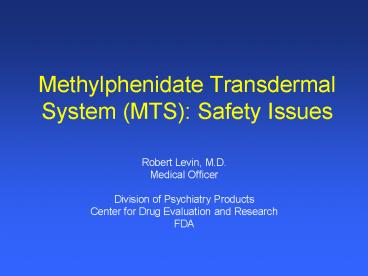Methylphenidate Transdermal System (MTS): Safety Issues - PowerPoint PPT Presentation
1 / 17
Title:
Methylphenidate Transdermal System (MTS): Safety Issues
Description:
elevated BP & mood lability. Discontinuations Due to AE in Study 302. Syncope. Abdominal pain ... Irritability, anger, or lability. 10. Nausea/vomiting. 12 ... – PowerPoint PPT presentation
Number of Views:80
Avg rating:3.0/5.0
Title: Methylphenidate Transdermal System (MTS): Safety Issues
1
Methylphenidate Transdermal System (MTS) Safety
Issues
- Robert Levin, M.D.
- Medical Officer
- Division of Psychiatry Products
- Center for Drug Evaluation and Research
- FDA
2
Initial Pivotal Studies N17-018
- MC, R, DB, PC, dose titration study
- ADHD 6 to 12 years old
- 6-week. 4 Wk DB
- Started with 12.5 or 18.75 cm2 patch
- Titration weekly
- (range 6.25 to 50 cm2)
- Wear time 12 hrs
- Later, could decrease wear time to 8.5 to 9 hrs
3
Initial Studies N17-010
- MC, R, DB, PC dose titration 3-week study
- ADHD 6 to 12 years old
- Started at 6.25 cm2
- Titrated weekly
- Wear time 12 hrs
4
Initial Safety Issues (NA)
- Excessive drug exposure at inappropriate times
(evening) - Unacceptable safety profile
- Anorexia
- Weight loss
- Insomnia
- Excessive skin irritancy
- Potential for skin sensitization
5
Common AE in Initial Studies
Study 010 010 018 018
Adverse event MTS () PTS ( ) MTS () PTS ()
Anorexia 17 2 50 2
Weight loss 0 0 10 1
Insomnia 17 3 29 5
Nervousness 5 2 10 0
Twitching 3 0 7 0
6
Recommendations by the Division
- Decrease patch wear time (from 12 hrs)
- Classroom study, PK/PD, time course of effect
- Prospectively monitor insomnia w/ specific scale
- Possible signal for skin sensitization with
periods of use longer than the 6-week duration of
the study. A skin exposure study of longer than
6-week duration would be helpful in investigating
this potential signal - Use an active comparator
7
New Studies for Resubmission
- Study N17-201
- MC, R, DB, PC dose optimization and Analog
- classroom crossover study
- 5-week open-label MTS treatment
- 2-wk DB, PC phase
- Patch sizes 12.5, 18.75, 25, and 37.5 cm2
- Wear time 9 hours
- Frequent PK and efficacy assessments
8
New Study for Resubmission
- Study N17-302
- MC, R, DB, PC and Active-controlled (Concerta)
outpatient dose optimization study - -Patch sizes 12.5, 18.75, 25, and 37.5 cm2
- -Wear time 9 hours
- -Concerta doses 18, 27, 36, and 54 mg
9
Safety Findings
- No deaths or serious adverse events
- Discontinuations due to adverse events
- Study 201
- 8 of O-L group and 1 of PC group (all MTS)
- Tic (2)
- rash at site (2)
- anorexia (2)
- prolonged QT
- elevated BP mood lability
10
Discontinuations Due to AE in Study 302
MTS Tics Reaction at application site (2) Headache Irritability Crying Confusional state
Concerta Syncope Abdominal pain Aggression Anger Headache
11
Adverse Events in 201 O-L Phase
Anorexia or decreased appetite 29
Insomnia 16
Headache 12
Nausea/vomiting 10
Irritability, anger, or lability 8
Tic 2
Weight loss 2
Tremor 2
Rash at application site 3
Blood pressure elevated 1
Tachycardia 1
QT interval prolongation 1
12
AE in Placebo-controlled Phase
MTS PTS
Nausea 4 0
Headache 4 0
Anorexia 3 0
Elevated blood pressure 3 0
Rash 1 2
13
Adverse Events in Study 302
MTS Concerta Placebo
Decreased appetite 26 19 5
Anorexia 5 3 1
Headache 15 20 12
Insomnia 13 8 5
Nausea 12 8 2
Vomiting 10 10 5
Weight decreased 9 8 0
Tic 7 1 0
Irritability 7 8 5
Affective lability 6 3 0
14
Weight Loss
- Trend toward weight loss in both studies (M C)
- Mean weight decreased in MTS groups (-1.3 to
- -2.2 lbs). Concerta group (-2.1)
- Decreases in mean z-scores for weight and BMI
201 decreased from -0.08 to -0.15 - 302 MTS decreased from 0.05 to -0.21
- 302 Concerta decreased from 0.28 to 0.04
15
Sleep Ratings- CSHQ
- Childrens Sleep Habits Questionnaire
- Directed assessment 33 items
- Sleep quality, sleep latency, duration,
disturbance, etc. - Study 201 in most dosing groups, sleep ratings
improved in the O-L PC phases - Study 302 sleep ratings improved in the MTS,
Concerta, and placebo groups. - Subscales bedtime resistance, delayed onset,
sleep duration. Scores improved in all 3
treatment groups
16
Tics Twitching
- Twitching
- Study 010 MTS (3) vs. Placebo (0)
- Study 018 MTS (7) vs. Placebo (0)
- In some cases, the investigator terms facial
tics, buco-lingual tic, and mouth movements were
coded to the preferred term twitching - Tic Study 201 2. Study 302 7 Concerta 1
- Discontinuations due to tic and twitching
17
Dermatology Findings
- Skin sensitization study results
- sensitization occurred in 13-22 of subjects.
- Thus, sensitized patients should not take MPH by
any route again after sensitization. - Dermal response- erythema or irritation at the
- application site
- Study 201 PC phase MTS (24- 30) vs. PTS (3-
6) - Study 302 mean dermal response score was higher
than other groups at all visits































